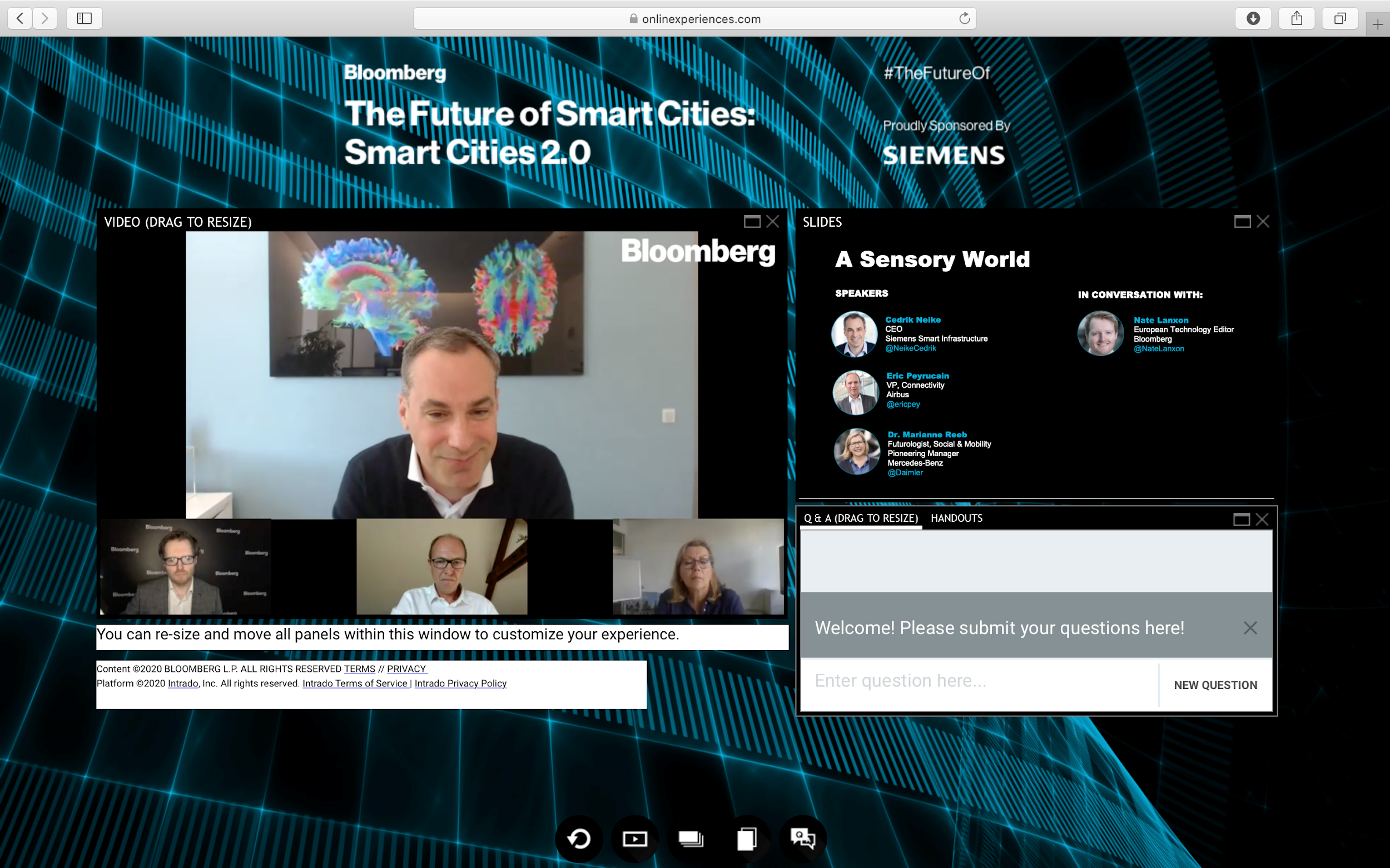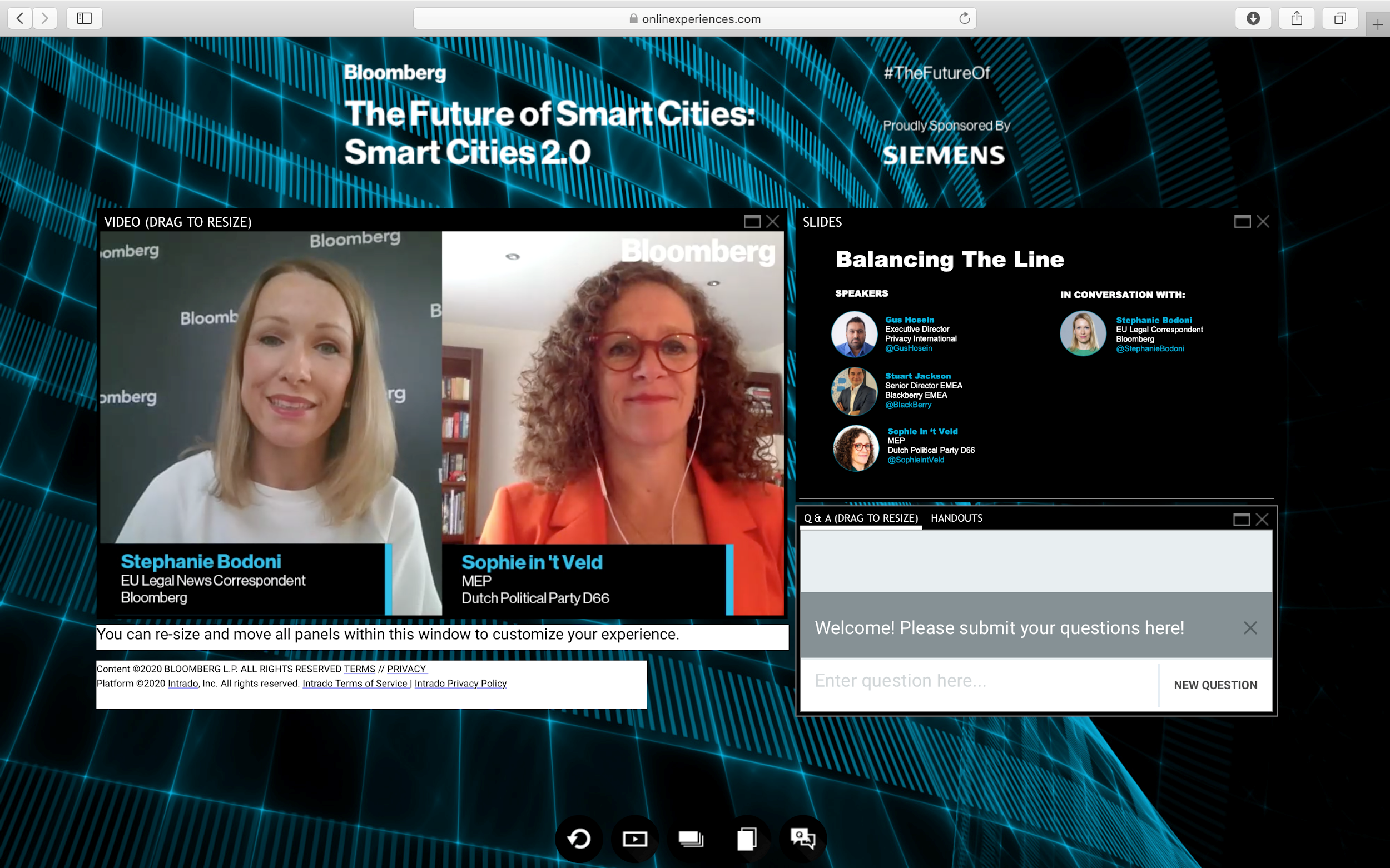At Bloomberg’s July 7 virtual event, The Future of Smart Cities: Smart Cities 2.0, Bloomberg European Technology Editor, Nate Lanxon, and Bloomberg EU Legal Correspondent, Stephanie Bodoni, had a series of conversations with key smart cities stakeholders.
The event started with a panel discussion focused on sensors that included Cedrik Neike, CEO, Siemens Smart Infrastructure; Eric Peyrucain, VP, Connectivity, Airbus and Dr. Marianne Reeb, Futurologist and Manager of Society & Mobility Pioneering, Mercedes-Benz. This was followed by a discussion on data privacy with Gus Hosein, Executive Director, Privacy International; Stuart Jackson, Senior Director EMEA, Blackberry and Sophie in ‘t Veld, MEP, Dutch political party D66. The event concluded with insights from Bloomberg Intelligence’s Sonia Baldeira.
Keep reading for key insights – and you can watch the full event here.

A few of the key takeaways included:
- Cedrik Neike, CEO, Siemens Smart Infrastructure said that the construction industry is the least digitized industry that exists at the moment. Silos between planning, construction and utilization of buildings means that most of the energy in buildings is wasted. This is important at this juncture for two reasons: firstly, because we’ve become more aware of wasted energy and secondly, because technology now allows us to act upon it. Neike said that a human-centric approach to sensor activity is crucial and that Siemens had previously been adding sensors to buildings to bring people together, but in the age of coronavirus will now be using them to help ensure safe distances between people.
- Eric Peyrucain, VP, Connectivity, Airbus stated that with 10,000 aircrafts flying around the world, 80% are currently not digitized with many of them having been constructed in the 1980s or 1990s. Airbus’ latest A350 aircrafts have been built to be digitally native and are producing more than 400,000 pieces of information per second, Peyrucain said. Airbus is now implementing sensory retrofits to its aircrafts and using the data with its Skywise analytics platform. Customers will soon be able to use their smartphones to be notified on the status of toilet queues as well as make payments for food and drink on flights.
- Dr. Marianne Reeb, Futurologist and Manager of Society & Mobility Pioneering, Mercedes-Benz said that there will not be one company that makes cities smart, it needs a lot of stakeholders working together on solutions. “If we do not work together then you won’t have a smart city,” she added. Reeb went on to say that we will see a time gap between newly built cities and older ones which will take a significantly longer time to implement new infrastructure. The most important factor for smart cities is that “you have to take the people with you.” If they feel enriched in their life, if they feel supported, they will use the technology and this really is the precondition that smart cities, smart homes, smart mobility will work, Reeb concluded.

- Stuart Jackson, Senior Director EMEA, Blackberry shed light on the challenge of having independent states all requesting data be held within certain jurisdictions, a situation which has been further complicated by Brexit. “We need to make access to data available but also be mindful of the fact that people want to be anonymous while also being secure. There needs to be equilibrium struck between the two” Jackson said. “We have to have enough data available to make people secure but not so much so we know where they are.” Jackson said that Blackberry’s goal is ultimately to reduce a friction experience while allowing users to be anonymous.
- “We would also like to see smart cities, and smart infrastructure, but we have yet to see an example where this has been done well and governed well,” said Gus Hosein, Executive Director, Privacy International. “We’ve struggled with the data governance problems, and so as we talk about smart cities, all we’re talking about is deploying more and more sensors in the world and we have no mechanism for governing them,” he added. Hosein wants to see “open” smart cities in which nobody has privileged access and where sensors are genuinely useful to people and not just authorities. Hosein concluded by pointing towards the situation we are seeing with the Huawei controversy: “Now we are starting to question what is going on beneath the surface. Is this technology serving the interests of the person who is buying and deploying the technology or is it serving the interests of somebody else, say for example the Chinese government? I worry we will be much more paranoid about the technology and that doesn’t end us in a good place.”
- Sophie in ‘t Veld, MEP, Dutch political party D66 said that responsible governance is a matter of political will. “I’m not a big believer in the notion that there has to be a trade-off between smart systems and our rights, privacy and data,” she said. Veld went on to say that striking the balance can be done, but it requires strict enforcement of legislative principles and that companies, together with local authorities, need to have the right incentives in place. “There is an insatiable appetite for personal data from public authorities who are notoriously bad at protecting our privacy,” she cautioned. Given that the combined budget for all European protection authorities equals just one week of Facebook’s turnover, Veld said, it would be helpful to have a worldwide agreement on data protection and privacy to provide the visibility and the weight which the Paris Agreement has.
- Bloomberg Intelligence’s Sonia Baldeira concluded the event with the view that we are at a tipping point with smart cities where the concept can be used to fight climate change, air pollution and equality. “There is a lot of investment across all sectors when it comes to smart sensors, but finding a balance between social and economic returns is important,” Baldeira said. Baldeira stressed that there is a lot still to be done on smart regulation, particularly when it comes to finding a consensus and a global approach on data protection.

Bloomberg’s The Future of Smart Cities: Smart Cities 2.0 was proudly sponsored by

——————————
Join the Conversation: #TheFutureOf
Instagram: @BloombergLive
LinkedIn: Bloomberg Live
Twitter: @BloombergLive
Interested in more Bloomberg Live virtual events? Sign up here to get alerts.
——————————